Students in the WAID Program can use engineering-related internships with development or relief agencies as the basis of their technical paper if they are seeking a non-thesis MS degree. Students can use more extensive international experiences with an engineering component as the basis of their MS thesis. Students can also participate in funded research projects as part of their MS theses or PhD dissertations. Examples of recent and current research projects are listed below.
Estimating Water Supply for Small Coral Islands.
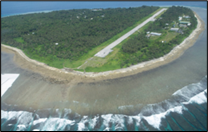
These projects (led by Dr. Bailey) have used modeling tools to estimate the quantity of stored rainwater and groundwater for small coral islands under near-term climatic events (drought, typhoons) and long-term events such as climate change and population growth. Projects have focused on the Federated States of Micronesia, the Republic of the Marshall Islands, and the Republic of Maldives. Models have been used to estimate groundwater supply under climate and anthropogenic stresses, including sea level rise, future rainfall patterns, and increased groundwater pumping due to population growth. Rainwater catchment models have been used to estimate rainwater supply under drought conditions and provide design criteria for new rooftop catchment systems. These projects have also produced tools, such as the coral island groundwater volume estimator, that are used by island water managers. Projects have been funded by the World Bank, the U.S. Geological Survey, and the Secretariat of the Pacific Community.
Optimal Drinking Water Disinfection. The Environmental Fluid Mechanics Research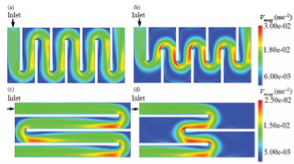 group led by Dr. Venayagamoorthy has been developing optimal drinking water disinfection contact tanks that are commonly used by small public water systems in the United States. This research, funded by the Colorado Department of Public Health and Environment (CDPHE), has culminated in a guidance document that CDPHE now uses to help small drinking water systems in Colorado. A collaborative project in partnership with Umgeni Water (which is responsible for potable water supply to the eThekwini Metropolis that serves over 5 million people in South Africa) developed effective and sustainable solutions for treatment of drinking water in Sub-Saharan Africa, where improved water quality is a critical need.
group led by Dr. Venayagamoorthy has been developing optimal drinking water disinfection contact tanks that are commonly used by small public water systems in the United States. This research, funded by the Colorado Department of Public Health and Environment (CDPHE), has culminated in a guidance document that CDPHE now uses to help small drinking water systems in Colorado. A collaborative project in partnership with Umgeni Water (which is responsible for potable water supply to the eThekwini Metropolis that serves over 5 million people in South Africa) developed effective and sustainable solutions for treatment of drinking water in Sub-Saharan Africa, where improved water quality is a critical need.
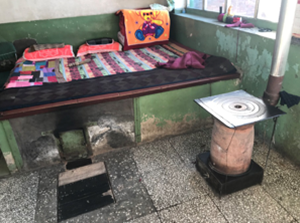 Household Transitions to Clean Heating Energy (Beijing, Shanxi). Dr. Carter’s group has been conducting a field campaign in two provinces in China to evaluate indoor, outdoor, and personal air and environmental quality. The measurements at baseline and following large-scale implementation of a combined coal ban and clean space heating technology among rural households has provided insight on the potential health and climate impacts of these policies.
Household Transitions to Clean Heating Energy (Beijing, Shanxi). Dr. Carter’s group has been conducting a field campaign in two provinces in China to evaluate indoor, outdoor, and personal air and environmental quality. The measurements at baseline and following large-scale implementation of a combined coal ban and clean space heating technology among rural households has provided insight on the potential health and climate impacts of these policies.
The Role of Housing in Modifying Air Pollution Exposure in Low- and Middle-Income Countries (Columbia). Dr. Carter’s group has conducted a field measurement campaign, joining a team of epidemiologists and environmental health scientists, to study the sources and patterns of air pollution in neighborhoods undergoing urbanization and the impacts of those air pollution exposures on health and subclinical markers of chronic disease. In particular, the project has focused on the measures of indoor and outdoor air quality, air pollution chemical composition, and the residential building envelope to elucidate spatial and temporal patterns of exposure.
US-Pakistan Centers for Advanced Studies in Water. The purpose of this project was to build a state-of-the art applied research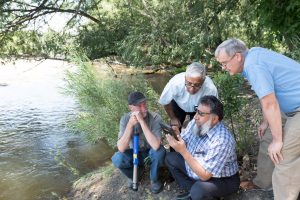 center in water resources at Mehran University of Engineering and Technology in Pakistan to
center in water resources at Mehran University of Engineering and Technology in Pakistan to
(1) improve private sector innovation and modernization, (2) strengthen government policy to stimulate economic growth, and (3) contribute solutions to Pakistan’s development in the water sector. Major activities included curriculum development, faculty and graduate student exchanges and scholarships, and applied research. CSU focused on the areas of irrigation/drainage, hydraulics, and integrated water resources management. Topics of collaborative research included evaluating the impact of polymers on reducing seepage from earthen canals, multi-level remote sensing for the characterization of soil salinity across broad irrigated regions, and modeling and remediation of salinization in irrigated and drained fields. This project was sponsored by the United States Agency for International Development (USAID). CSU (led by Dr. Gates) was the major subcontracting partner under the University of Utah.
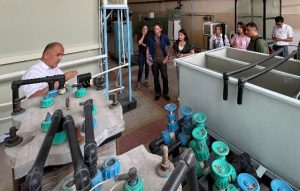 Colorado State University and Tashkent Institute of Irrigation and Agricultural Mechanization Engineers Partnership. The collaboration between CSU and TIIAME (led by Dr. Omur-Ozbek) aims to train the next generation of engineers and scientists to tackle global water challenges while equipping them with cultural competence and scientific communication skills. The course developed through this collaboration, CIVE 421, provides a foundation to develop cross-cultural competence in the engineering and environmental sciences field, considering global social, economic, regulatory, and technological differences in areas such as water resource management, water quality management, water/wastewater treatment, environmental justice, sustainability, and ethics. The interconnected world creates an urgent need for engineers and scientists to be able to recognize global challenges regarding water availability and quality and to work with international partners and develop solutions for societies with different cultures. Students in the course interact with students and professors from CSU, and the partner institutions in Central Asia including Uzbekistan, Kazakhstan, and Tajikistan. These partnerships can open doors for future study abroad or research opportunities for students interested in further immersive international experiences.
Colorado State University and Tashkent Institute of Irrigation and Agricultural Mechanization Engineers Partnership. The collaboration between CSU and TIIAME (led by Dr. Omur-Ozbek) aims to train the next generation of engineers and scientists to tackle global water challenges while equipping them with cultural competence and scientific communication skills. The course developed through this collaboration, CIVE 421, provides a foundation to develop cross-cultural competence in the engineering and environmental sciences field, considering global social, economic, regulatory, and technological differences in areas such as water resource management, water quality management, water/wastewater treatment, environmental justice, sustainability, and ethics. The interconnected world creates an urgent need for engineers and scientists to be able to recognize global challenges regarding water availability and quality and to work with international partners and develop solutions for societies with different cultures. Students in the course interact with students and professors from CSU, and the partner institutions in Central Asia including Uzbekistan, Kazakhstan, and Tajikistan. These partnerships can open doors for future study abroad or research opportunities for students interested in further immersive international experiences.